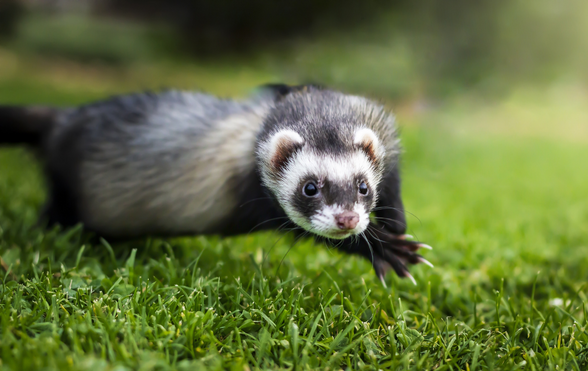That said, ferrets who are kept in a cage all the time can become unhealthy. They must have some free time to explore and run around every day. Although very friendly, ferrets are not recommended as pets for young children, as they may bite or scratch if handled roughly.
Male ferrets are larger than the female. An adult ferret usually weights around 3 to 4 pounds, though some can weigh up to 6 pounds.
What do ferrets eat?
Ferrets are natural carnivores, which means their food requirements centre around meat. They do not need any vegetables, fruits, nuts or grains at all. Additionally, as they have a high metabolism, they need high levels of animal fat in their diet.
The ideal ferret diet is a combination of shop bought ferret food (or kibble) and raw animals. It is important to buy good quality ferret food as some of the cheaper brands contain high levels of plant protein (as opposed to meat protein), which can be harmful, and even lethal, to your ferret.
Cat and dog food is not recommended for ferrets (though some kitten food can be okay).
Baby ferrets need to be nursed by their mothers until they are 6 weeks old. After that, they can be given the same food as adult ferrets, though is it recommended to soak dry or hard food in warm water for 5 to 10 minutes before offering it to very young ferrets.
A couple of recommended brands of ferret food to use are
Burgess ferret food and Chudleys ferret food, as they are made mostly from meat and animal fat.
Your ferret needs the protein and fibre in kibble to stay healthy, and the raw animals will help keep your ferret’s teeth healthy and prolong its life. You can buy both from a pet shop (the kibble can also be purchased online).
It is a good idea to introduce your ferret to different types and flavours of food when it’s young, to make sure it’s used to a varied diet. Otherwise, if you have to change its food later on, it can make your ferret sick.
Ferrets can be picky, so buying food in bulk is not recommended (in case it goes stale). Your ferret will likely prefer to eat small meals several times a day. Therefore, dry food should be available to it at all times (especially if your ferret is left unsupervised for large parts of the day).
If you want to make sure your ferret is getting all of its nutritional requirements, you can give it food supplements to boost its diet.
You can get food for ferrets from Jollyes, as well as toys, bedding and other essentials.
What shouldn’t ferrets eat?
Ferrets should not be fed processed meats and sugary or salty food. Additionally, chocolate, grapes and raisins are poisonous to ferrets and they should not be given any dairy (as they are lactose intolerant).
What do ferrets drink?
You must always have fresh water available for your ferret. This can either be supplied from a drinker bottle (which ferrets can be trained to drink from), or a bowl (make sure the bowl is heavy so that your ferret cannot tip it over and spill the water).
The water must always be kept away from your ferret’s little tray, to avoid contamination.
You can buy a drinking bottle for your ferret from
Jollyes.
What treats can you give ferrets?
Ferrets can be given non-acidic fruits like banana or watermelon as an occasional treat. However, as ferrets are carnivores, fruit is not a requirement in their diet. Another treat can be raw eggs in their shells, as your ferret will enjoy breaking though the shell to get to its food.
Cooked boneless chicken can make a nice treat for your ferret, but make sure it’s not too hot. Meaty baby food is another option.
There are also a lot of commercially available treats you can buy in pet shops that your ferret will enjoy.

Can you keep your ferret indoors?
Ferrets sleep for most of the day, so they are happy to be kept indoors.
Ferret housing
Your ferret’s cage should be big enough so that it has the room to play and exercise. Ferret cages usually have more than one level and include a dark enclosure to house the ferret’s nest for sleeping. Hanging up a hammock for your ferret in the cage can be a comfortable and fun option, as ferrets love to climb.
Ferret bedding: For bedding, ferrets like to sleep on a soft surface. There are several options here – you can use shredded paper or high quality hay, but, for less mess and extra comfort for your ferret, you can also use a towel, small blanket or nesting box. The bedding should be washed or changed regularly (but keep in mind standard detergents may be harmful for your ferret).
The floor of the cage should be lined with newspaper or wood shavings.
Petcare 247 offer various accessories for small pets, including cages and bedding.
Find out more about insuring your ferret for £2,000 of vet fees.
Get a quote
Alternatively you can call us on 0345 982 5505
Cleaning the cage: The cage should be cleaned at least once weekly (preferably every other day), particularly as ferrets like to hide food, which can go mouldy if left in the cage too long.
Additionally, the cage should not be placed too close to sources of heat or cold, like radiators or air conditioning units, or somewhere with a draft or direct sunlight.
Ferrets and litter boxes: Your ferret can be trained to use a litter box or newspaper as its toilet. However, ferrets cannot ‘hold it in’ for as long as cats and dogs can, so you should have several litter trays for your ferret – one in its cage and at least one in the room it plays in (preferably in a corner), to avoid accidents.
You can use cat little trays for your ferret, using wood shaving or newspaper for lining.
Unscented cat litter can also be used, though it is not recommended. You must clean your ferret’s litter tray every day.
It is important to note that keeping your ferret caged the whole day will likely harm its health. It needs free time every day to run around and explore its surrounding (even if this is just one room).
Can you keep ferrets outside?
It is possible to keep ferrets outside, but you must make sure you keep the enclosure in the shade all day long, as the heat from the sun can be fatal to them.
Similarly, they do not handle the cold very well either. If you cannot keep your ferret in the house, a better option is to keep it in an outbuilding or shed, where you can build it an aviary to play on.
An outdoor cage would be harder to keep clean, which can also be harmful for your ferret.
How much daylight do ferrets need?
The best thing for your ferret is to have its cage somewhere where it is exposed to natural light cycles, and avoid keeping it in artificial light as much as possible.
One option is to cover the section of the cage where your ferret sleeps if you need to turn the lights on in the room.
If the only time you can play with your ferret is when it is dark outside and you need artificial light to do so, that is okay, as long as you provide your ferret with a dark space to sleep in when it gets tired. In the wild, ferrets would dig burrows to sleep in, and so, even when kept as pets, they prefer total darkness to sleep.
Over-exposure to artificial light and not being provided with a dark environment to sleep in can cause your ferret to develop adrenal disease.
How many ferrets can live together?
Ferrets are highly sociable creatures. They can be kept on their own, as long as they receive plenty of attention and play time from humans. If this is not possible, it might be best to keep more than one ferret.
Ideally, ferrets should be kept either in a pair or a small group. Same sex litter mates or neutered males and females can be kept together.
Keep in mind that, if the worst happens and one of your ferrets dies, the remaining one of a pair will be lonely and sad – make sure to give it extra attention! However, if you have a small group, introducing a new ferret may prove difficult, as it may be rejected by the others.
Ferrets can get along with cats and dogs, but should not be left to play together unsupervised. Rabbits and rodents are less likely to get along with ferrets, and so should be kept away.
How long do ferrets live?
The average lifespan for ferrets is around 6-10 years. By 4 months, ferrets reach their full size.
How long do ferrets need to play?
Ferrets are very energetic and playful. Although they sleep for most of the day, it’s safe to say that, when not sleeping, they are likely to want to play.
Ferrets must be let out of their cage at least once a day for a minimum of 2 hours. They will want to explore their surroundings, but make sure they are supervised, as they are highly curious creatures and may accidentally hurt themselves or swallow something they shouldn’t while running around.
Ferrets love to play with their humans. If you see your ferret bouncing around, sometimes with its teeth bared, it is asking you to play. You should bounce with it, as that will make it extremely happy.
However, if your ferret ‘plays dead’, play along and pretend you cannot see it. Make a big show when it ‘comes back to life’, and see how happy you will make your little pet!
The best thing about play time with your ferret? The adorable giggling sound they make when they are happy (known as dooking).
When you cannot be around to play with your ferret, you should leave it with plenty of toys to occupy itself with. Have a variety available and switch them around daily so that your ferret does not get bored (as can easily be the case). These should be readily available from any pet store.
Ferrets can even be taken for a walk outside, but make sure you have a leash suited for ferrets, to avoid hurting your pet.
Ferrets are fascinating and endlessly entertaining creatures. Give your ferret the right environment to live and sleep in, and plenty of opportunity to play and interact with you, and you will get plenty of fun, and more than a few cuddles, in return!
Is your ferret insured? Get a quote for £2,000 of vet fee cover | Insure up to 3 pets per policy | We’ve been insuring exotic pets since 1996 | Check out our customer reviews on Feefo


